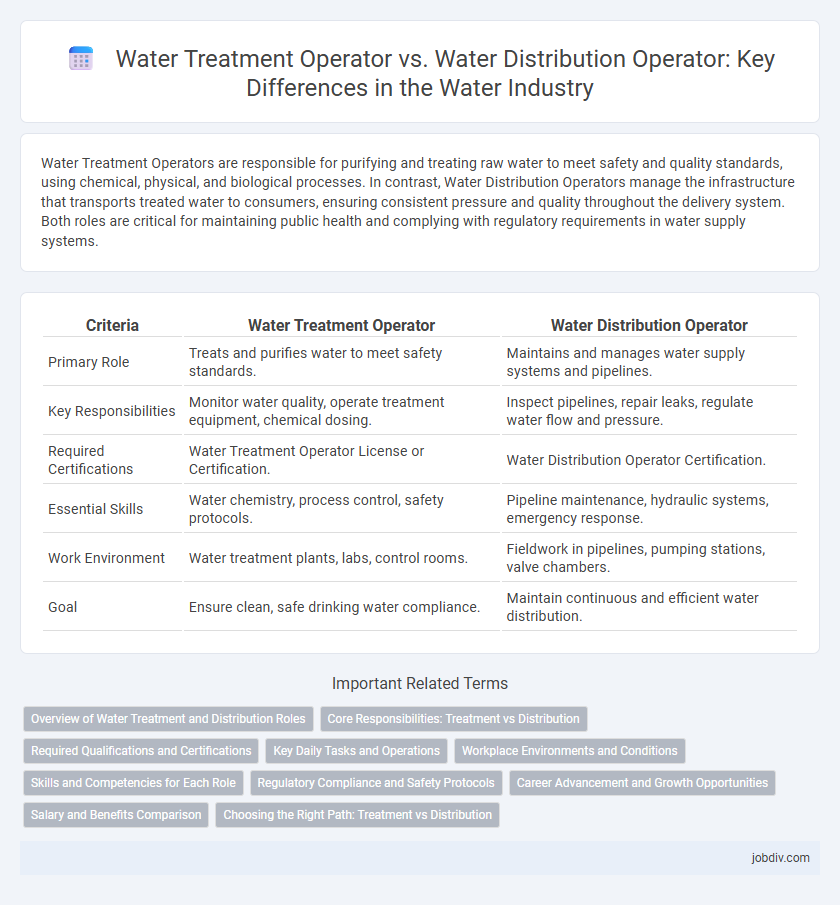Water Treatment Operators are responsible for purifying and treating raw water to meet safety and quality standards, using chemical, physical, and biological processes. In contrast, Water Distribution Operators manage the infrastructure that transports treated water to consumers, ensuring consistent pressure and quality throughout the delivery system. Both roles are critical for maintaining public health and complying with regulatory requirements in water supply systems.
Table of Comparison
| Criteria | Water Treatment Operator | Water Distribution Operator |
|---|---|---|
| Primary Role | Treats and purifies water to meet safety standards. | Maintains and manages water supply systems and pipelines. |
| Key Responsibilities | Monitor water quality, operate treatment equipment, chemical dosing. | Inspect pipelines, repair leaks, regulate water flow and pressure. |
| Required Certifications | Water Treatment Operator License or Certification. | Water Distribution Operator Certification. |
| Essential Skills | Water chemistry, process control, safety protocols. | Pipeline maintenance, hydraulic systems, emergency response. |
| Work Environment | Water treatment plants, labs, control rooms. | Fieldwork in pipelines, pumping stations, valve chambers. |
| Goal | Ensure clean, safe drinking water compliance. | Maintain continuous and efficient water distribution. |
Overview of Water Treatment and Distribution Roles
Water Treatment Operators manage the purification and quality control processes that ensure safe drinking water by operating filtration, chemical dosing, and disinfection systems. Water Distribution Operators oversee the maintenance and operation of the infrastructure delivering treated water to consumers, including pipelines, pumps, valves, and storage tanks. Both roles are critical in maintaining regulatory compliance and public health by ensuring consistent water quality and reliable delivery.
Core Responsibilities: Treatment vs Distribution
Water Treatment Operators primarily manage the purification process by controlling chemical dosing, filtration, and disinfection to ensure safe drinking water compliance with EPA standards. Water Distribution Operators focus on maintaining and repairing pipelines, valves, and pump stations to guarantee consistent water delivery and pressure throughout the distribution network. Both roles require monitoring system performance and responding to emergencies, but Treatment Operators emphasize water quality control while Distribution Operators oversee infrastructure integrity and service reliability.
Required Qualifications and Certifications
Water Treatment Operators require certifications such as the Grade 1 or Grade 2 Water Treatment Operator certificate, often mandated by state regulatory agencies, reflecting knowledge in chemical dosing, filtration, and disinfection processes. Water Distribution Operators typically hold certifications like the Grade 1 or Grade 2 Water Distribution Operator license, emphasizing expertise in pipeline maintenance, leak detection, and system hydraulics. Both roles demand compliance with Environmental Protection Agency (EPA) standards and completion of continuing education to maintain licensure and ensure public health safety.
Key Daily Tasks and Operations
Water Treatment Operators focus on monitoring and adjusting chemical levels, ensuring filtration systems run efficiently, and conducting water quality tests to comply with safety standards. Water Distribution Operators maintain pipeline infrastructure, repair leaks, operate pumps and valves, and manage pressure levels to ensure consistent water delivery to end users. Both roles require rigorous adherence to regulatory guidelines to protect public health and maintain system integrity.
Workplace Environments and Conditions
Water Treatment Operators typically work in controlled indoor environments such as treatment plants, where they monitor and adjust chemical levels to ensure water quality standards. Water Distribution Operators primarily operate outdoors, managing pipelines, valves, and hydrants in varied weather conditions to maintain the delivery system's integrity. Both roles require attention to safety protocols, but Water Distribution Operators face more physical demands and exposure to environmental elements.
Skills and Competencies for Each Role
Water Treatment Operators require skills in chemical dosing, filtration process management, and water quality testing to ensure compliance with environmental regulations. Proficiency in operating advanced treatment technologies, interpreting laboratory data, and maintaining treatment equipment is essential for this role. Water Distribution Operators need competencies in pipeline maintenance, system troubleshooting, and hydraulic system operation to manage the delivery infrastructure effectively.
Regulatory Compliance and Safety Protocols
Water Treatment Operators ensure regulatory compliance by monitoring and adjusting treatment processes to meet EPA and state water quality standards, preventing contaminants from entering the water supply. Water Distribution Operators maintain safety protocols by inspecting and repairing distribution systems, minimizing risks of leaks, cross-connections, and ensuring safe delivery of potable water. Both roles require rigorous adherence to Occupational Safety and Health Administration (OSHA) guidelines to protect public health and operator safety.
Career Advancement and Growth Opportunities
Water Treatment Operators specialize in managing water purification processes, providing critical expertise for transitioning into roles like Water Quality Analyst or Treatment Plant Supervisor, which offer enhanced responsibilities and leadership opportunities. Water Distribution Operators focus on the delivery infrastructure, developing skills in system maintenance and emergency repair that can lead to career paths such as Distribution Manager or Infrastructure Project Coordinator. Both career tracks present advancement potential, but Treatment Operators typically access higher-level technical roles while Distribution Operators often progress into operational management and logistical planning positions.
Salary and Benefits Comparison
Water Treatment Operators earn an average salary of $52,000 annually, while Water Distribution Operators typically make around $50,000 per year, with variations based on location and experience. Both roles often include benefits such as health insurance, retirement plans, and paid leave, but Water Treatment Operators may receive additional hazard pay due to exposure to chemicals. Opportunities for overtime and advancement tend to be higher for Water Treatment Operators because of the technical nature of their responsibilities.
Choosing the Right Path: Treatment vs Distribution
Water Treatment Operators specialize in purifying raw water by managing filtration, chemical dosing, and compliance with EPA standards, ensuring safety and quality for public consumption. Water Distribution Operators focus on maintaining and operating the water delivery systems, including pipelines, valves, and pressure controls, to provide reliable access to treated water across communities. Selecting the right career path depends on whether you prefer controlling water quality processes or managing the infrastructure that delivers potable water to customers.
Water Treatment Operator vs Water Distribution Operator Infographic

 jobdiv.com
jobdiv.com